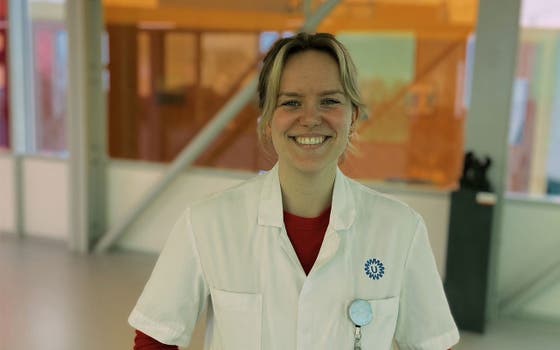Role of placenta in babies with congenital heart defect

Children with a severe congenital heart defect are at risk of delayed brain development. In the early development of these children, not only the heart but also the placenta plays an important role, according to research by PhD student Maaike Nijman (UMC Utrecht) that appeared in the Journal of the American Heart Association.
Lees artikel in het Nederlands >
Every year in the Netherlands, about 170 babies are born with a serious heart defect. Within the WKZ, we conduct unique research, focusing on the heart but also on brain development in this vulnerable group of babies. Brain damage affects the quality of life of these newborns. It can lead to lifelong problems with learning, behaviour and movement.
"If it becomes clear during pregnancy that there is a heart defect, we know that these babies are also at risk of growth retardation in the brain," says Maaike. "In this vulnerable group of babies, an MRI is therefore made of the baby in the abdomen, a second MRI scan follows after birth and if the baby has undergone heart surgery a third MRI scan follows. The MRIs show that these babies often have delayed brain development even before birth." But the researchers look wider: "There are also more frequent placental abnormalities in these pregnancies. The vascular genes that take care of placental development are the same genes that take care of heart development."
To explain the research clearly, first the basics: "The placenta is an organ and a kind of joint project of mother and baby. Both contribute cells to the formation of the organ. The placenta separates the mother's bloodstream from the baby's bloodstream. Through the placenta's thin membranes or membranes, nutrients, oxygen, hormones and antibodies are passed to the baby. Through the umbilical cord, these substances reach the baby."
Detecting anomalies
Together with two pathologists, Maaike studied almost 100 placentas. They looked at which abnormalities might be related to brain damage, with the flaws in the placenta weighing in different severities. Maaike: "If you have a very small placenta, for example, that will have more effect on the child than if you have a very mild inflammation in the membranes. So based on that, we gave points for each consideration. And also the number of abnormalities in the placenta counts. You can imagine that if you have a small placenta and also inflammation in the membranes, that together gives a greater effect than just a small placenta."
Mirror of pregnancy
According to Maaike, the placenta is the mirror of pregnancy. "When a mother is not healthy, abnormalities can already develop in the placenta in the first 12 weeks of pregnancy, for example because blood vessels are not properly constructed at that time. Especially in the third trimester of pregnancy, the cerebral cortex and cerebellum need a lot of oxygen and glucose to grow. The more abnormalities there are, the worse the placenta is likely to function, with health consequences for the unborn child's development. Even before birth, therefore, these babies may be at a disadvantage." What do doctors do to mitigate the effects of placental abnormalities? Maaike has some ideas about that: "If we discover these kinds of abnormalities already during pregnancy, we can provide care in the interests of the unborn child," she says. "There are ongoing studies looking at whether you might be able to optimise placental function with some help to the mother. With extra oxygen, magnesium sulphate or melatonin for the mother, we could influence the component that leads to oxygen deprivation or mild inflammation, for example. In that way, we could make a difference."
Opportunities in cooperation
The heart defect itself may primarily cause less blood containing oxygen and glucose to reach the brain in these babies. However, the mechanism leading to this reduced brain development has multiple causes. "We need to think about this in multidisciplinary teams with gynaecologists, neonatologists, cardiologists, intensivists, pathologists and thoracic surgeons," states Manon Benders, professor of neonatology at UMC Utrecht. "In this area, we fortunately also work closely with these researchers at Leiden University Medical Centre."
